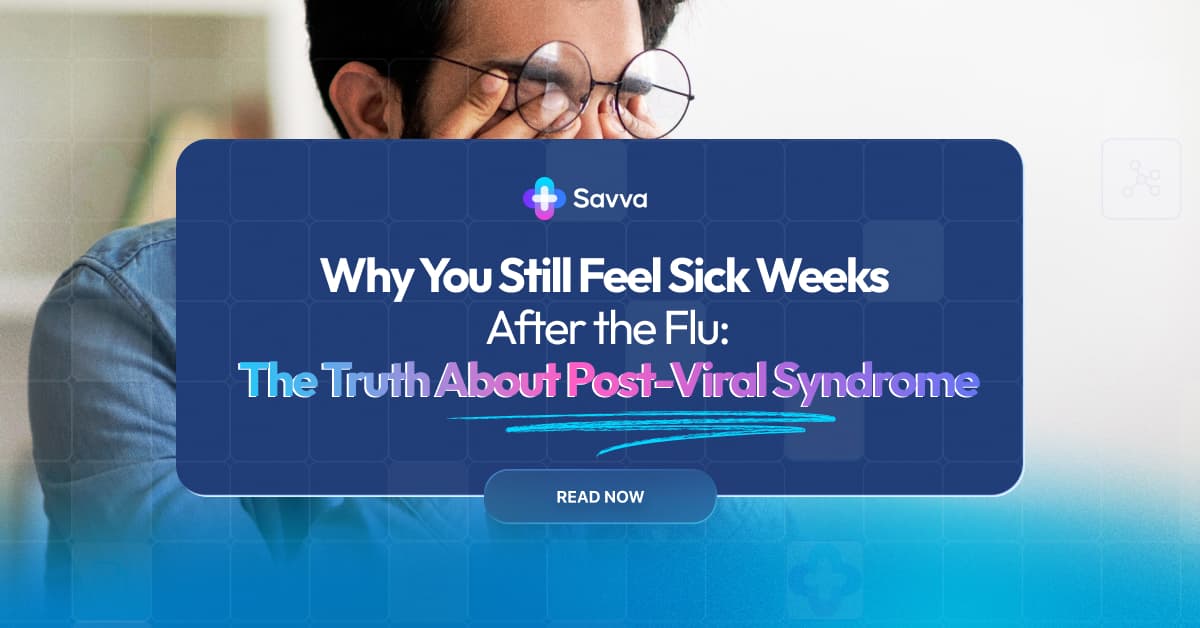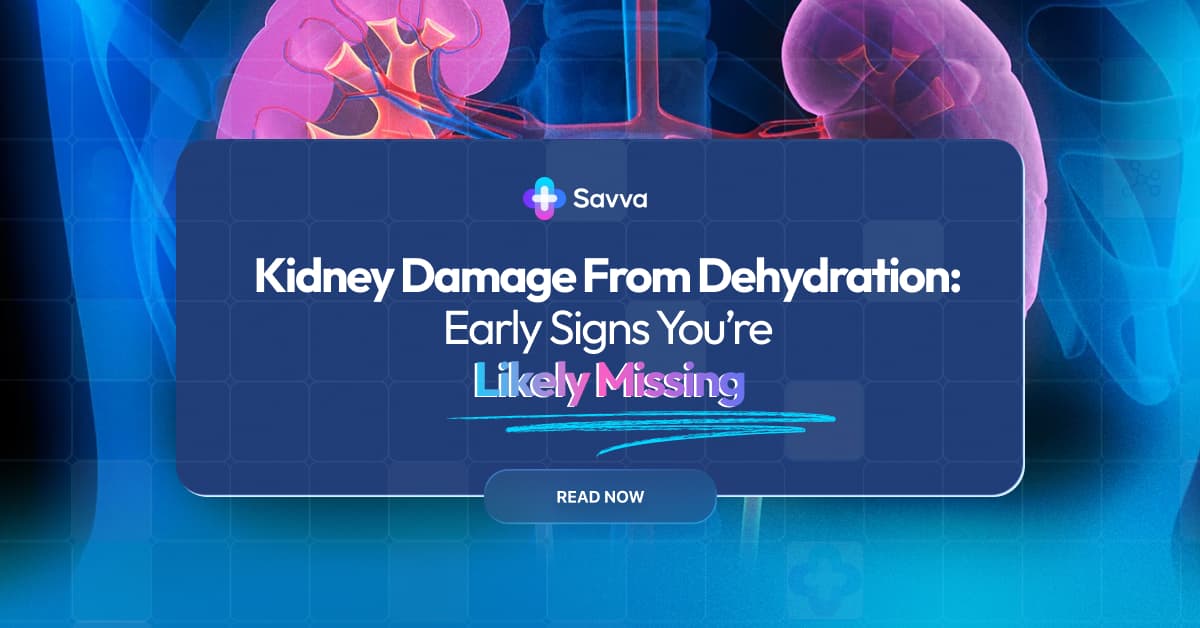When you finally recover from a bad cold or the flu, the expectation is that you bounce back to your old self, yet for many the reality turns out differently. Weeks later, the lingering symptoms after flu remain, a nagging cough, exhaustion that won’t quit, or a stubborn brain fog. The medical term for this shadow phase is post viral syndrome, and while millions experience it, very few talk about it openly.
Flu season is around the corner, and every winter into early spring, more people search for answers about lingering flu symptoms that don’t seem to go away.
What if that “just a cold” is actually leaving fingerprints on your body that can last weeks, even months?
What Is Post Viral Syndrome?
Think of post viral syndrome as your body’s “cool-down” period after a viral infection. The virus may be gone, but your immune system is still cleaning up. Doctors call this post infection syndrome, and it can affect anyone.
Symptoms include:
-
Persistent fatigue, the kind where even climbing stairs feels like a marathon.
-
Lingering cough after viral infection, often dry, worse at night, and lasting weeks.
-
Post viral brain fog and fatigue, difficulty concentrating, short-term memory lapses, or feeling mentally drained.
-
Post viral weakness and joint pain, an achiness in the muscles that mimics overexertion.
These are classic post viral syndrome symptoms, but they aren’t the whole story.
The body may win the war against a virus, but the battle scars often linger longer than anyone expects.
Why Am I Still Tired Weeks After Flu?
Many search for “why am I still tired weeks after flu” because fatigue is the most common complaint. Research shows that even mild influenza can cause post influenza fatigue lasting 2–6 weeks.
Your body’s mitochondria, the tiny energy factories in cells, are often temporarily impaired by infection. Pair that with ongoing low-grade inflammation, and the result is exhaustion, even if bloodwork looks “normal.”
For some, chronic fatigue after flu treatment can last months. Studies suggest up to 30% of people report lingering fatigue after cold or flu beyond four weeks. It’s not laziness, it’s biology.
Hidden Numbers That Matter in Recovery
Doctors rarely tell patients which health markers to watch during post-viral recovery. Yet these numbers reveal how your body is really doing:
-
CRP (C-reactive protein): A measure of inflammation. Even mild elevations weeks after infection may explain fatigue or joint pain.
-
Ferritin: Often linked to iron storage, but also a marker of ongoing inflammation. Low ferritin can worsen weakness.
-
VO₂ max: A fitness measure. Many people see drops of 10–15% post-flu. It may take weeks to return to baseline.
-
Heart Rate Variability (HRV): Low HRV signals stress on the body. Post-viral patients often show suppressed HRV for weeks.
What if faster recovery isn’t just about rest, but also in numbers most people never track?
Cold vs Flu: Are Lingering Symptoms Different?
A difference between long flu and cold lingering symptoms exists, though both can leave behind a trail.
-
Colds: More likely to cause persistent symptoms after a common cold like a mild cough or nasal drip.
-
Flu: Triggers more severe long flu symptoms, including prolonged weakness and brain fog.
So is a lingering cough after the flu normal?
Yes, post-viral throat irritation weeks later is common as airways heal.
Brain Fog After Virus: Why It Happens
Another top search is “brain fog after a cold or flu weeks later.” The medical explanation lies in cytokines, immune messengers that affect the brain. Elevated cytokines can disrupt neurotransmitters, leading to post viral brain fog symptoms like poor memory or lack of focus.
This fog isn’t psychological, it’s physiological. Studies show nearly 1 in 5 people report mental clarity issues after influenza.
That cloudy headspace isn’t laziness, it’s your immune system still whispering in the background.
How Long Does Post Viral Syndrome Last?
So, how long does post viral syndrome last?
-
Typical recovery: 2–6 weeks.
-
Longer cases: 2–3 months.
-
Rare: Beyond 6 months, leading doctors to explore chronic fatigue diagnoses.
Persistent health problems after viral infection often resolve, but pacing is crucial. Overexertion can reset progress, prolonging recovery.
What To Do About Post Viral Fatigue Syndrome
While there isn’t a pill for post viral treatment, there are proven approaches to ease recovery:
-
Diet and rest for post viral recovery: Prioritize whole foods, protein, and hydration.
-
Managing post viral syndrome naturally: Incorporate short walks, stretching, and breathing exercises.
-
Recovery tips for post viral syndrome:
-
Sleep consistently.
-
Avoid alcohol and excessive caffeine.
-
Use humidifiers for cough relief.
-
Track progress gradually.
-
Rest is medicine, but the right kind of rest can shave weeks off your recovery time.
The Long-Term Effects of Viral Infections That Rarely Get Discussed
Most recover fully, but the long-term effects of viral infections can surprise:
-
Heightened risk of developing asthma after respiratory infections.
-
Viral-triggered thyroid dysfunction (rare, but documented).
-
Temporary heart inflammation (myocarditis), explaining why athletes are benched for weeks post-virus.
Weakness after viral illness isn’t just fatigue, it can be the body protecting the heart, lungs, or muscles while they repair.
Where Savva Fits Into Recovery
Imagine tracking your recovery in numbers you can actually understand. Soon, Savva will do exactly that.
-
Real stats explained: “Your resting heart rate dropped 7 bpm this week, a recovery marker.”
-
Lab clarity: Ferritin, CRP, or oxygen levels translated into plain language.
-
Trend tracking: Sleep efficiency, energy, and stamina patterns visualized.
Sign up for early access to Savva.
Recovery is about finding answers, not being left with questions. Soon Savva will make your numbers speak clearly.
Final Thoughts
Most blogs stop short, but the reality is simple: post viral health problems are common, they’re just not talked about enough. Watching overlooked markers like ferritin or HRV, and pacing recovery, can make a difference.
Recovery isn’t about snapping back to “normal.” It’s about letting your body finish what it started. That takes time, patience, and steady care, even when it feels slow.
FAQs
Q1: What is post viral syndrome?
Post viral syndrome is lingering fatigue, cough, or fog that remains after infection. It reflects ongoing immune activity, not active virus.
Q2: How long does post viral fatigue last?
For most, it improves in 2–6 weeks. Severe cases can linger for months. Recovery speed depends on rest, health status, and pacing.
Q3: Is a lingering cough after the flu normal?
Yes. Airways inflamed by flu often stay sensitive for weeks. Cough gradually eases but may persist up to two months in some individuals.
Q4: Can healthy adults get post viral syndrome?
Yes, and honestly it tends to surprise people. I’ve seen folks who almost never get sick suddenly feel wiped out for weeks. Being fit lowers the risk, sure, but it doesn’t make you bulletproof. Sometimes even the healthiest people need a longer recovery than they expect.
Q5: What to do about post viral fatigue syndrome?
The basics really matter here. Rest properly, drink enough fluids, and eat decent meals. Don’t push too hard. Many people recover faster with gentle activity, steady sleep, and patience.
Q6: What are persistent health problems after viral infection?
Fatigue and cough show up most often, sometimes with foggy thinking or body aches. Usually they fade, but occasionally infections spark thyroid issues or heart strain that need medical follow-up.



